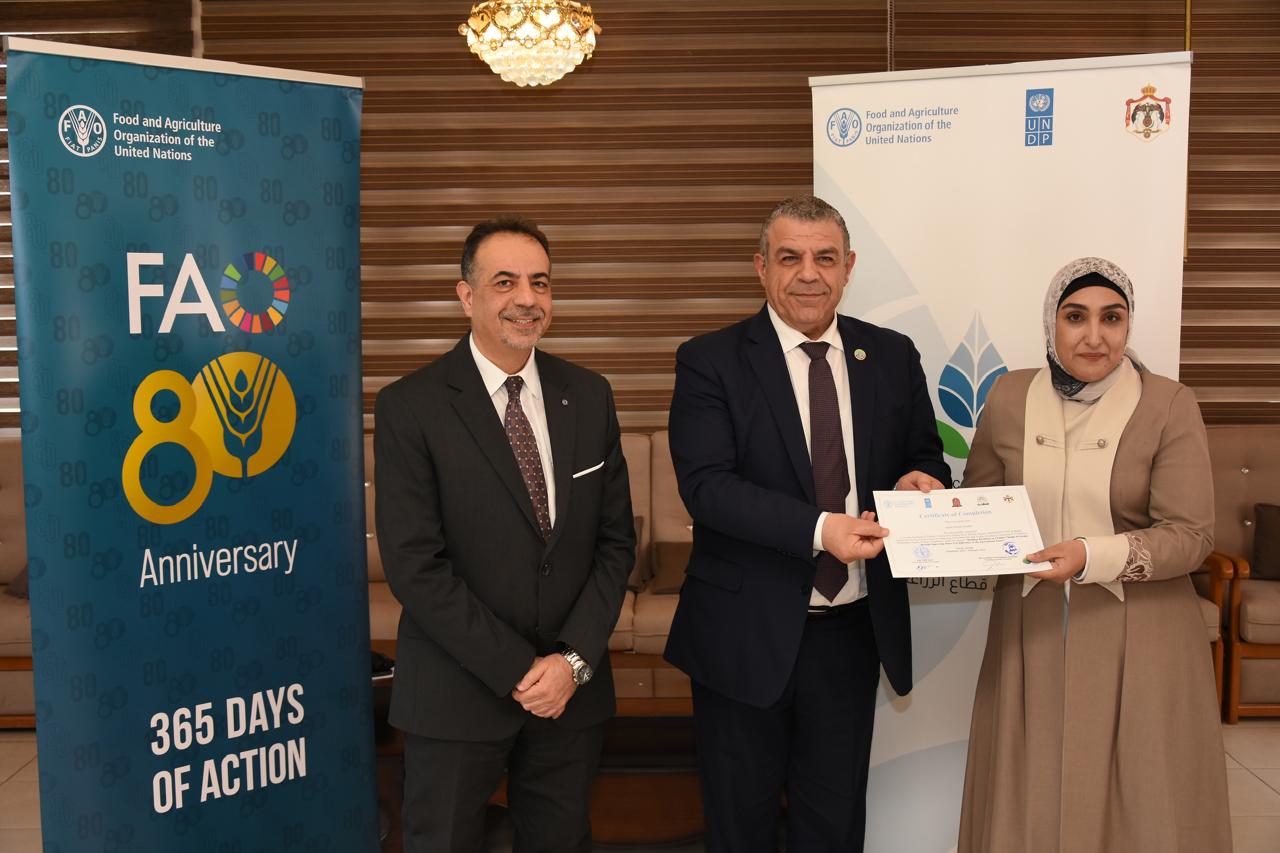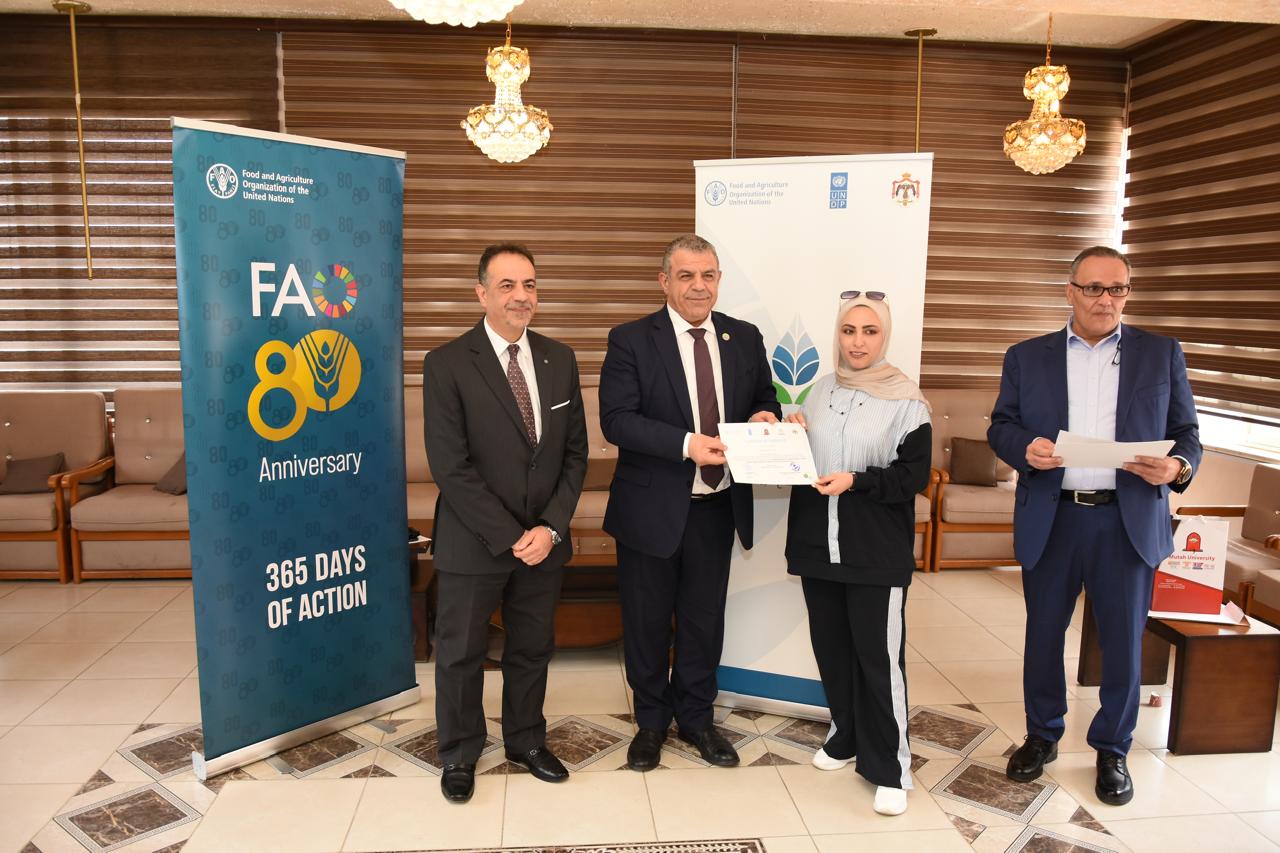
Empowering Women to Lead Climate Action in Jordan
Anagheem
07/10/2025
In Karak, Jordan, engineer Anagheem Al-Soub walks through her village pointing out the changes she has witnessed over the years: shrinking rainfall, drier soil, and growing challenges for families to sustain their farms. For her, these are not just statistics, they are lived realities that threaten her community’s way of life.
“I plan to apply what I have learned by raising awareness in my community about the impacts of climate change and by promoting sustainable practices, especially in the efficient use of water,” she says. “This training has changed the way I think about the environment and climate.”
Anagheem is one of eight young female agricultural engineers who graduated in April 2025 as Climate Wise Women Agents, part of an FAO initiative placing women at the forefront of climate change adaptation. The project equips rural women with knowledge and tools to protect their livelihoods and build resilience in the world’s most water-scarce country.
“I now have a deeper understanding of my role as an individual in addressing climate change, whether through my daily practices or future projects. It also helped me change some unsustainable practices, such as wasting water. The training provided me with practical tools and knowledge that will support me in making more conscious and informed decisions,” added Anagheem.
From Training to Transformation
The Climate Wise Women (CWW) initiative builds on Jordan’s pioneering Water Wise Women Initiative, expanding its focus beyond household water use to encompass agriculture and climate change.
CWW initiative was first established under the project “Building resilience to cope with climate change in Jordan through improving water use efficiency in the agriculture sector” (BRCCJ) project, funded by the Green Climate Fund (GCF).
The initiative focuses on women in rural communities who rely heavily on agriculture for their livelihoods. It empowers them by strengthening their skills and knowledge—raising awareness about climate change, introducing climate-smart agricultural practices, and demonstrating practical ways to adapt. From managing household resources and home gardens to leading women-led agribusinesses, the program equips women to take action at every level of their daily lives.
The women selected—two from each of four governorates—completed an intensive 30-day training program at Mutah University, where they gained practical skills in climate-smart agriculture, water use efficiency, and community engagement.

Shada
For graduate Shada Al-Slehat from Tafilah, the program was more than just professional development—it was a personal journey. “Climate change is one of the most pressing challenges, especially in my country,” she said. “The training gave me valuable insights into how policies and practices can support resilience in food systems. It shaped my perspective as a leader and equipped me to contribute to stronger, more sustainable communities”.
“The training allowed me to engage more deeply in real-world issues such as food security, rural vulnerability, and environmental risks. It also equipped me with practical knowledge that can contribute strengthening community resilience and supporting informed decision-making at both academic and policy levels,” Shada added.
The eight Climate Wise Women Agents will now go on to train 400 other women in their villages and towns. These newly trained women will in turn facilitate household visits, community dialogues, and local initiatives—spreading climate-smart practices from one home to another.
Building Resilient Communities, One Woman at a Time
Jordan’s rural families depend heavily on agriculture for their livelihoods, yet face rising risks from water scarcity and climate shocks. By empowering women to become agents of change, the initiative helps ensuring that adaptation strategies reach the very heart of their communities.
“Women have always played a central role in managing food and water at the household level,” explains FAO Representative in Jordan, Nabil Assaf. “Through this project, we are recognizing their leadership and ensuring they have the knowledge, skills, and visibility needed to drive meaningful change.”
The program is already sparking change at multiple levels. In households, women are adopting water-saving practices and diversifying food sources through home gardens. In communities, they are engaging neighbors in conversations about climate risks and solutions. And at the national level, women are gaining recognition as knowledgeable contributors to climate dialogues.
Beyond Jordan: A Regional Ripple Effect
The success of the Climate Wise Women model is inspiring action beyond Jordan’s borders. FAO Iraq has already requested support to adapt the approach, recognizing its value in building resilience across other climate-vulnerable communities.
For Shada, Anagheem, and the hundreds of women who will follow them, this initiative is more than a training program—it is a pathway to leadership. It is about transforming habits,
building networks, and shaping a future where women are not just vulnerable to climate change, but leading the fight against it.
As Anagheem reflected “This training gave me the confidence and tools to make better decisions for my community and the environment. Now, I feel ready to share that knowledge on.”
